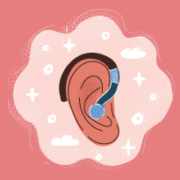Stave Off Dementia? Groundbreaking News About Hearing Aids
Study: This Step Could Cut Cognitive Decline Risk in Half
Figuring out a crossword puzzle. Remembering to pick up the grandkids. Learning a new language. Excelling at a high-stakes workplace project. The ability to think, remember, and process information plays a huge role in your life, but hearing loss could get in the way. In fact, untreated hearing issues can go hand in hand with brain decline and significantly elevate the risk of dementia.
The good news? An exciting study published in summer of 2023 in prominent health journal The Lancet found that the use of hearing aids and audiologic counseling could cut the risk of cognitive decline by nearly 50%. Research has long highlighted connections between hearing and brain functioning. Discover what this latest development from the ACHIEVE study is all about and what it could mean for your hearing and brain health.
Answering a Critical Question
The ACHIEVE study, an extensive investigation conducted over three years, sought to learn “whether treating hearing loss could reduce cognitive decline or the risk of dementia.” Growing evidence already pointed to hearing loss being a potentially modifiable risk factor for dementia, and past research already linked hearing aid use to an 18% lower risk of a dementia diagnosis among older adults. The present investigation, however, marked the first randomized controlled trial on the potential effect of hearing loss treatment on cognitive decline and dementia.
With 977 participating men and women ages 70 to 84 with untreated hearing loss and normal cognition or mental processes, the study divided the respondents between a control group that learned about topics including healthy aging and an intervention group that received hearing technology as well as audiologic counseling. Both groups were monitored over a three-year period, with follow-up assessments every six months — culminating in a comprehensive neurocognitive test. Researchers reviewed outcomes related to cognitive decline, brain structure, mental health and well-being, physical functioning, and health-care use.
Among other findings, the study concluded that the combined intervention of hearing aids and audiologic counseling delayed the deterioration of thinking and memory by 48% in those at greater risk of cognitive decline. Healthy participants already at decreased risk for cognitive decline did not see an effect from the hearing intervention. According to the study, however, that could simply mean they needed more than the allotted observation period.
To fully appreciate why this research is so exciting, it’s important to understand a fundamental concept underlying the investigation: cognitive decline.
Understanding Cognitive Decline
Though sometimes mentioned interchangeably with “dementia,” cognitive decline is separately defined. In basic terms, it’s a diminished ability to think, focus, reason, remember, problem-solve, or handle other tasks involving brain functioning. Cognitive decline goes beyond typical changes that can occur with aging. For example, it’s more than just taking a little longer to absorb or react to a story or instructions. Instead, it’s a more involved state that can range from mild cognitive impairment to a more serious disorder that can interfere with everyday living.
Dementia is a subset of cognitive decline — diagnosed when cognition reaches a certain level of dysfunction. It affects over 55 million people, is a leading cause of death, and is responsible for at least $1.3 trillion in economic costs on a global scale, reports the World Health Organization (WHO). Often confused with Alzheimer’s disease, “dementia” is actually an umbrella term for severe decline that includes conditions such as Alzheimer’s. Per WHO, Alzheimer’s is the most prevalent type of dementia, responsible for as many as 70% of cases.
Catching cognitive problems early — especially if there’s a reversible or treatable underlying cause or modifiable risk factor — may head off or delay potential issues such as dementia.
Connecting Hearing Loss and Dementia Risk
Hearing can naturally decline with aging. This can lead to potential communication challenges, as many people with hearing difficulties often delay having the issue diagnosed and treated. Even among those who do seek treatment, their hearing technology can end up at home, unused. Left unaddressed, hearing loss can go hand in hand with social, mental, and physical health challenges, including cognitive decline and dementia.
Various theories abound on exactly why hearing loss and cognitive decline are linked or how hearing aids may help stave off dementia, but the science isn’t yet conclusive. The ACHIEVE team pointed to three ways hearing loss might lead to dementia:
Brain shrinkage
Hearing loss may affect the brain’s integrity, resulting in accelerated brain atrophy that can deleteriously affect functioning. This concept has been explored before. Renowned otolaryngology expert and ACHIEVE co-principal investigator Frank Lin, M.D., Ph.D., helped lead a 2014-published study tying hearing loss to faster-than-normal brain shrinkage among older adults.
Brain drain
Wear and tear on the cochlea may cause the inner ear to send signals to the brain that aren’t clear. Consequently, the brain has to put more effort into understanding sounds correctly, reallocating resources from other tasks. Overall this may reduce brainpower, reinforcing what many may not realize: Both the ears and brain work together to facilitate hearing.
Social isolation
Those with hearing loss can be less likely to engage in social gatherings and activities that stimulate cognition. This lack of social interaction is associated with a higher risk of dementia. A 5,022-participant study published in January 2023, for example, found a 27% higher chance of dementia in older adults experiencing social isolation. Regular interaction may be a key component to quality of life.
Prioritizing Your Hearing Health
The ACHIEVE team’s work makes one thing clear: Addressing your hearing health is crucial. When was the last time you had your hearing checked? If you have hearing aids, do you wear them often? If you aren’t sure about your hearing, it’s more important than ever to have it tested by a hearing care professional. Even minor cases of hearing loss can benefit from using hearing aids, and we know they may play a crucial role in helping preserve brain health, in addition to simply helping you experience all the sounds.
If you haven’t checked out the latest innovations in hearing aids, they may surprise you. Cutting-edge options not only offer crisp, natural-sounding audio but complement today’s high-tech living. With various features like Bluetooth connectivity, invisibility, noise reduction, language translation, remote care, easy streaming of calls, venue-specific settings, and even emergency fall detection, these advanced devices go above and beyond what you’d ever expect. And it’s easy to explore them firsthand with a fun, personalized demo.
Preventing dementia and other forms of cognitive decline requires a comprehensive approach. Taking care of your hearing health is part of the equation. Safeguarding brain function also includes getting regular physicals, staying active, and choosing nutritious foods. If you also try to get enough sleep and engage in continuous learning, you’ll help keep your brain sharp with the best of ‘em. Adhering to these potentially preventive measures is even more important for folks with underlying comorbidities or risk factors for cognitive decline.
With so many benefits in store, what are you waiting for? Scheduling regular hearing checkups — just as you would for your eyes and teeth — goes a long way toward helping protect your overall health. Book your hearing evaluation with our caring team today!













